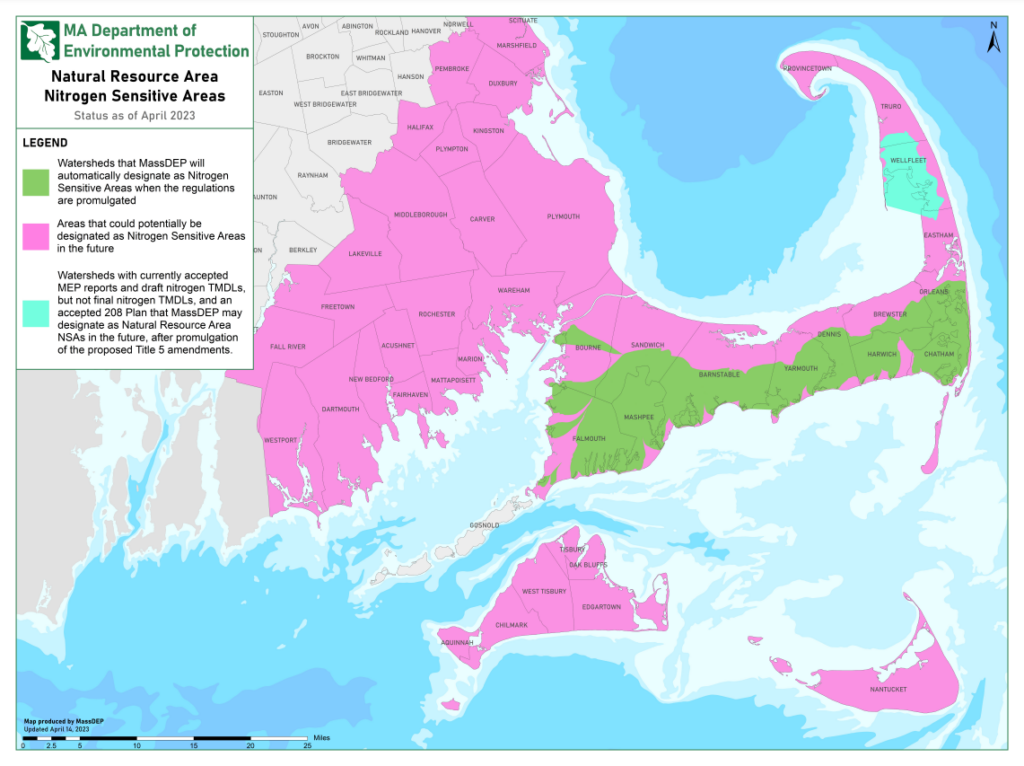2023 Title 5 Regulation Changes
On July 7th, 2023, the Massachusetts Department of Environmental Protection (MassDEP) made significant changes to it’s septic system regulation. Title 5 (310 CMR 15.000) governs the siting, construction, and expansion of on-site sewage treatment in Massachusetts. These changes are currently being implemented on Cape Cod, MA, and currently only apply to designated nitrogen-sensitive natural resource areas. These may be expanded to other regions in the future.
Nitrogen Sensitive Areas
Cape Cod’s water resources are threatened by myriad sources of contamination including pesticides, nitrogen and phosphorus from wastewater and fertilizers, and other chemicals such as pharmaceuticals and PFOS. There are two types of Nitrogen Sensitive Areas. Under state regulations, protections from nitrogen contamination for public water supplies have been in place for decades (so-called “Zone II’s”). Recent updates provide for a new type of Nitrogen Sensitive Area, called a “Natural Resource Area”, to protect coastal waters from excessive nitrogen contamination.
Public and Private Water Supply Protection Areas
Also known as ‘Drinking Water Protection’ areas, these areas include public and private wells and wellfields approved or awaiting approval by the MassDEP (known as Zone IIs and Interim Wellhead Protection Areas respectively), and areas with on-site septic systems and non-public drinking water supply wells. These Nitrogen Sensitive Areas remain unchanged in the updated regulations.
Natural Resource Areas
The updated regulations designate new areas that are sensitive to the discharge of pollutants from on-site sewage systems as Natural Resource Areas (NRAs). NRAs include watersheds or embayments with a maximum pollutant level for nitrogen, called a Total Maximum Daily Load, approved by the Environmental Protection Agency. You can find an interactive map and address lookup tool for these new areas here.

Within Natural Resource Areas, towns will have the option of:
Applying for a Watershed Permit
Under the regulation changes, a town may apply for a Watershed Permit issued by the MassDEP. Only towns can apply for Watershed Permits. The Watershed Permit allows towns to use a range of nitrogen-reduction solutions including but not limited to installing sewer, nitrogen-reducing Innovative/Alternative septic systems, permeable reactive barriers, fertigation wells, wetland and cranberry bog restoration, shellfish aquaculture, among others. The Technologies Matrix developed by the Cape Cod Commission provides an overview of the different types of technologies a town could employ under a Watershed Permit. Pursuing a Watershed Permit and meeting the Permit’s requirements is the only way a municipality can avoid mandatory 5-year I/A system upgrades for homeowners. Watershed Permits can be issued for multiple municipalities sharing a watershed.
Allowing Title 5 to Require Upgrades
In municipalities that choose not to pursue a Watershed Permit, homeowners in newly designated Natural Resource Areas will be required to upgrade their existing septic with “Best Performing Nitrogen Reducing Technology” within 5 years of July 7th, 2023. This includes Nitrogen-reducing Innovative/Alternative (I/A) septic systems. While traditional septic systems protect human health, they are inadequate at removing the nitrogen that pollutes our waters. Through biological processes, I/A systems provide enhanced wastewater treatment designed to protect our health and environment by removing nitrogen through biological processes. You can learn more about these systems on the Barnstable County Department of Health and Environment website. Best Available Nitrogen Reducing Technology is defined within these newly promulgated regulations, and a list of these technologies will be maintained on the MassDEP website.
Septic system upgrades will not be mandatory for all homeowners.
These changes currently only apply to designated nitrogen sensitive areas. For information about whether your home is located within an NRA, and for information about whether your town will be pursuing a Watershed Permit, please contact your town government.
If a town files a “Notice of Intent” to apply for a Watershed Permit within 2 years of the regulation changes the requirement that all homeowners in the watershed must install an I/A septic system is waived.
New construction in NRAs
Six months after July 7th, 2023, all new construction located within an NRA will be required to install nitrogen-reducing septic system technologies. If the town files a Watershed Permit or Notice of Intent to file a Watershed Permit, this requirement will be waived.
“Grandfathered” Septic Systems
While no systems will be allowed to be permanently “grandfathered in”, homeowners that have installed an I/A septic system in the last 10 years will not have to upgrade their systems until these systems fail or required by the local approving authority to upgrade. Homeowners required to install Best Available Nitrogen Reducing Technology due to these regulation changes will not be required to upgrade those systems as better technology becomes available.
